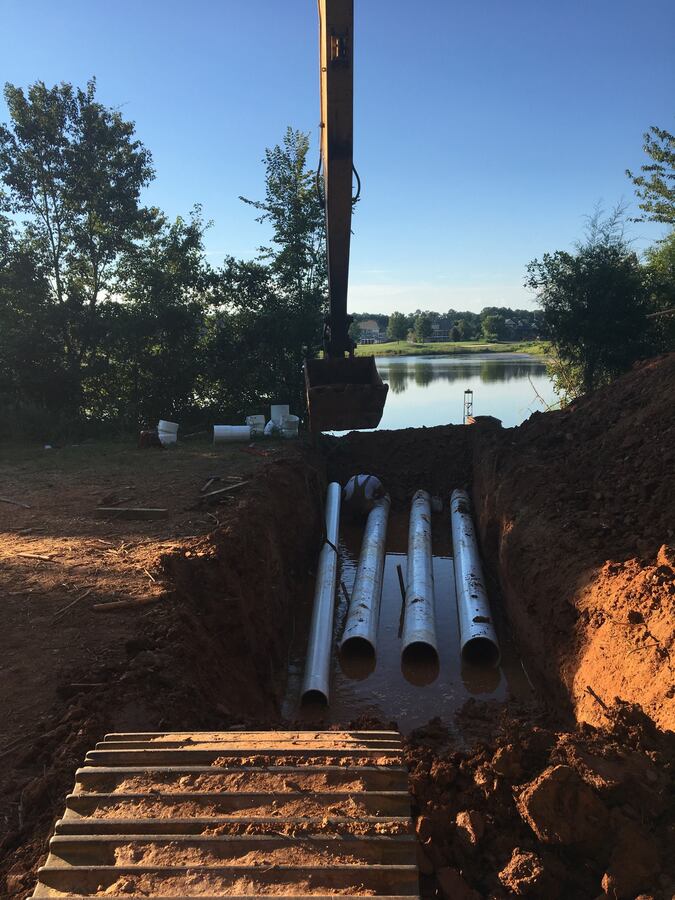
A siphon system is a valuable tool for managing water levels in lakes, ponds, and other contained bodies of water. It helps maintain ecological balance, prevents overflow or flooding, and protects surrounding structures and landscapes. This structure is known to support sustainable aquatic restoration.
In this article, our experts explain the role siphon installation plays in supporting sustainable aquatic restoration. If you need an expert to install a reliable siphon in your lake or pond, look no further than Aquatic Restoration.
One of the primary advantages of a siphon system is that it requires no external power source to operate. It uses gravity and water pressure to move excess water from one location to another, usually from a lake or pond to a downstream outlet. This passive flow system reduces energy use, minimizes maintenance needs, and provides consistent water level management year-round.
A functional siphon can prevent the adverse effects of flooding and shoreline erosion. Stable water levels support healthy vegetation along the banks, protect nearby infrastructure, and create better living conditions for aquatic life.
Many water bodies accumulate sediment and excess nutrients over time, especially from stormwater runoff, lawn fertilizers, and agricultural activity. These conditions lead to murky water, reduced oxygen levels, and harmful algal blooms that threaten fish and plant life. A well-designed siphon system can help with the flushing and renewal of lake water by encouraging movement and exchange with cleaner downstream areas.

This gentle water cycling process reduces stagnation and helps dilute nutrient concentrations. As a result, it discourages excessive algae growth and supports a healthier aquatic ecosystem. In restoration projects, siphons work alongside other natural filtration solutions like vegetated buffer zones and sediment traps to achieve long-term water quality improvements.
Traditional water management systems rely on electric or gas-powered pumps to move water, which can be noisy, costly, and environmentally taxing over time. Siphons, on the other hand, are quiet, self-operating, and designed for long-term use with minimal intervention. Their low-impact design makes them ideal for sensitive environments where mechanical disruption could cause further ecological damage.
Because siphons are so efficient and require little maintenance, they’re a preferred choice in restoration projects where sustainability and longevity are priorities. Whether it's part of a lake rehab, pond management in Georgia, wetland restoration, or stormwater retention upgrade, a siphon system provides a cost-effective solution.
Stable and healthy water conditions help to restore biodiversity in and around lakes and ponds. Aquatic species depend on consistent oxygen levels, safe spawning areas, and clean water. Siphon systems support these conditions by maintaining appropriate water depth and preventing harmful fluctuations that can disrupt breeding or feeding behaviors.
In addition, the controlled flow of water helps reduce thermal layering and encourages oxygen mixing, which benefits fish and bottom-dwelling organisms. With improved water quality and habitat conditions, native species are more likely to thrive, and invasive species are less likely to take hold.
Do you need a trusted contractor offering siphon installation services? Look no further than Aquatic Restoration. Perhaps you’re dealing with rising water levels, erosion around the shoreline, sediment buildup, or overflowing spillways. Whatever the case, the experts at Aquatic Restoration are here to help you install a dependable siphon. We’ve been in business for over 35 years and have a team of skilled technicians who are ready to get the job done right. We’ve successfully completed countless siphon installation projects, so we can be trusted to do a great job. Contact us today to book an appointment with our specialists and learn more about the services we offer.
Lake management is an integral part of keeping your lake in peak condition. It involves activities such as lake…
There are many incredible benefits that come with restoring natural lake depth. Not only does it improve water quality…
When it comes to maintaining healthy water bodies, there are two primary methods that are often used: dredging and pond…
There’s peace of mind in knowing you have a reliable detention pond on your property. These man-made ponds temporarily hold…
Owning waterfront property is a dream come true for many people. Everything from the stunning views to a relaxing lifestyle…